Do Bookshelves Matter?
‚ÄúFailstate Has Been Spotted in a Bookstore!‚ÄĚ proclaimed yesterday‚Äôs headline at the website of novelist (and former SpecFaith regular) John Otte.
Sure enough, there it is: Failstate: Nemesis, the final volume of the Failstate series.
And here I thought society wanted to move the concept of finding books in bookstores and buying them in bookstores and instead moving all our book things to the internet.
Apparently physical bookshelves and book copies still matter to us, in some way.
Occasionally I laugh at post-dystopian and science-fiction films and television shows that purport to show a future consisting only of gleaming swooshy chrome and glass buildings and furniture. Presumably in the future all physical books are extinct, not because of bad governments but because we just don’t need them for reading anymore; we need only use holograms or screens. This just doesn’t make sense, because humans have two impulses that will almost always push back against such potentially drastic societal overhauls.
1. Bookshelves matter as a human institution.
 The first impulse is that we’ve had bookshelves for centuries and there’s no real reason to stop now. Even if people could develop and live in anti-gravity, our houses would have chairs and tables. And I think we will always have bookshelves, even if they’re very small.
The first impulse is that we’ve had bookshelves for centuries and there’s no real reason to stop now. Even if people could develop and live in anti-gravity, our houses would have chairs and tables. And I think we will always have bookshelves, even if they’re very small.
By the way, better science fiction recognizes this. Captain Jean-Luc Picard in Star Trek appreciates older relics and model starships, and is often seen reading physical books. And it’s not just for budgetary reasons that even recent films such as Ender’s Game show futuristic appliances and vehicles operating inside and outside standard-suburb homes.
2. Bookshelves matter as a status symbol.
The second impulse is best explained this way: Legal firms’ cable TV commercials (if those are still around) feature(d) the suited attorney standing in front of a row of impressive bookshelves. This may be comical because they’re likely searching statutes more often in a digital version. But they will keep the bookshelves anyway because they look impressive.
We do the same‚ÄĒor at least I do. I like my impressive bookshelves. In my study, called the ‚Äústory room,‚ÄĚ I have three shelves: one for nonfiction and two for fiction, including classics. One more shelf featuring favorite fantastical books‚ÄĒLewis, Tolkien, etc.‚ÄĒis even more accessible in the dining area. And that one includes not only books but fantasy-esque d√©cor such as that The Lion, the Witch and the Wardrobe bookend or a Bilbo Baggins action figure.
But are bookshelves efficient?
You’ll notice what I left out above: anything about bookshelves being a better technology, easier to access, a better motivator for reading, or a more profitable way to promote books.
Arguably, bookshelves and physical books are not the best way to do any of those.
I‚Äôve only myself discovered this recently. Although I‚Äôve often made us of the Kindle desktop software, last year I bought my first smartphone and installed Kindle on it. Suddenly my reading took off. E-books are a better technology. They‚Äôre easier to access‚ÄĒon vacations, during lunch breaks, in the car, in the bedroom, and in‚ÄĒlet‚Äôs just come out and say it‚ÄĒin the bathroom. You can find free ebooks easier than real books (and I still have a backlog of complimentary novels and nonfiction books). And it‚Äôs far easier to find and buy ebooks.
No, but that’s not the point
We still want bookshelves. Surely we’ll always want them, even if it doesn’t make sense. We want them because they seem more human, feel like status symbols, and provide a kind of specialness that ebooks, despite their many advantages, can’t provide.
This is also true for book creators.
- ‚ÄúI wrote and published a downloadable ebook.‚ÄĚ Well, okay, cool.
- ‚ÄúI wrote and published a book that‚Äôs actually on store bookshelves.‚ÄĚ Huzzah!
Much nonphysical ink has been spilled‚ÄĒsome by myself‚ÄĒabout an apparent decrease in our zeal about digital publishing populism and amazing ebook revolutions and things. That is simply inevitable in the human story. Someone invents a car, but horse-drawn carriages continue at least as tourist attractions. Someone invents an electric shaver, but people give that a try and then go back to the disposable plastic razors. And someone invents e-reading without bookshelves, and people give that a try but then gradually find they are integrating this new approach into their reading instead of wholly replacing their real bookshelves.
My prediction is that people will continue to use both approaches to find novels. Sometimes we’ll browse actual bookstores. Sometimes we’ll browse the web, as Rebecca LuElla Miller explored in her Monday feature. And as you’re searching for stories on the web, stop by the SpecFaith Library. Not only does it feature every published Christian fantastical novel we can find, but it’s newly revamped to look more like, well, like a bookshelf.

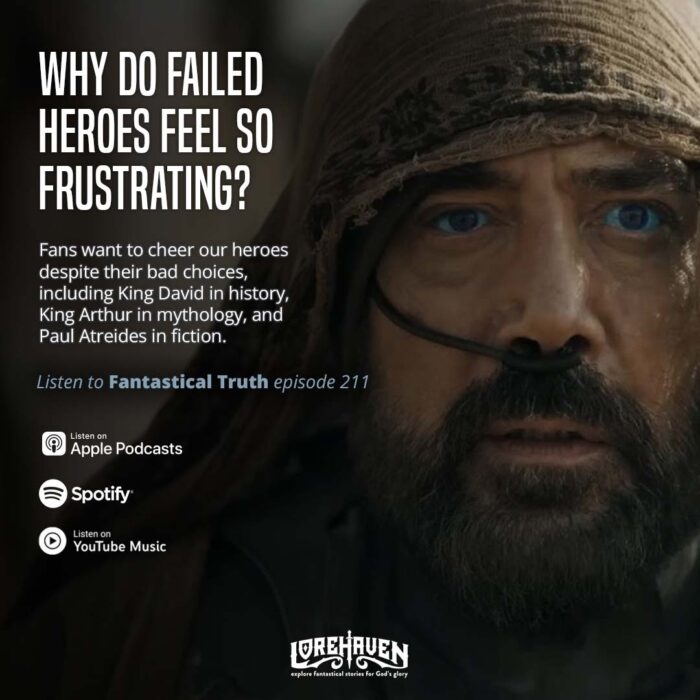

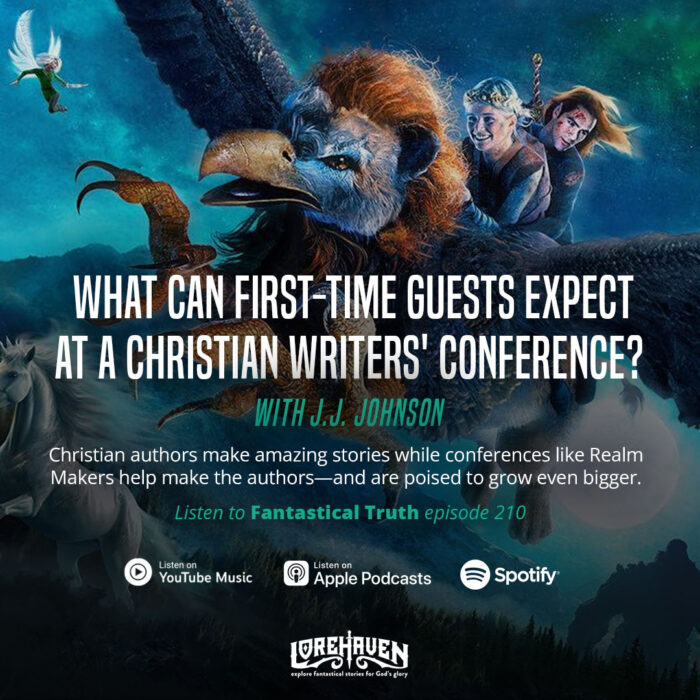






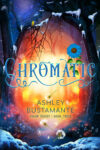























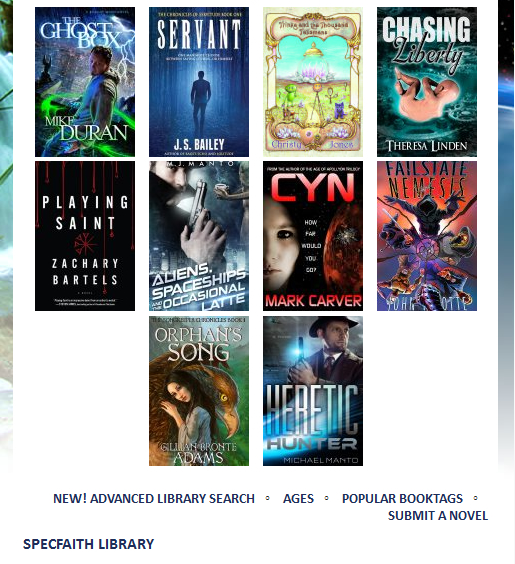

 much as people talk about him, they almost never say anything good. Jonah was a prophet, but he gets no respect.
much as people talk about him, they almost never say anything good. Jonah was a prophet, but he gets no respect.


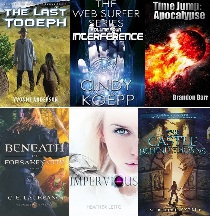

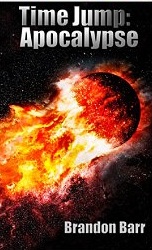
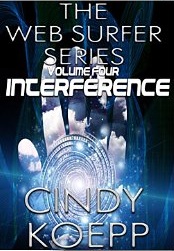
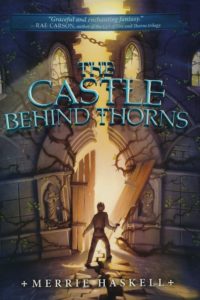
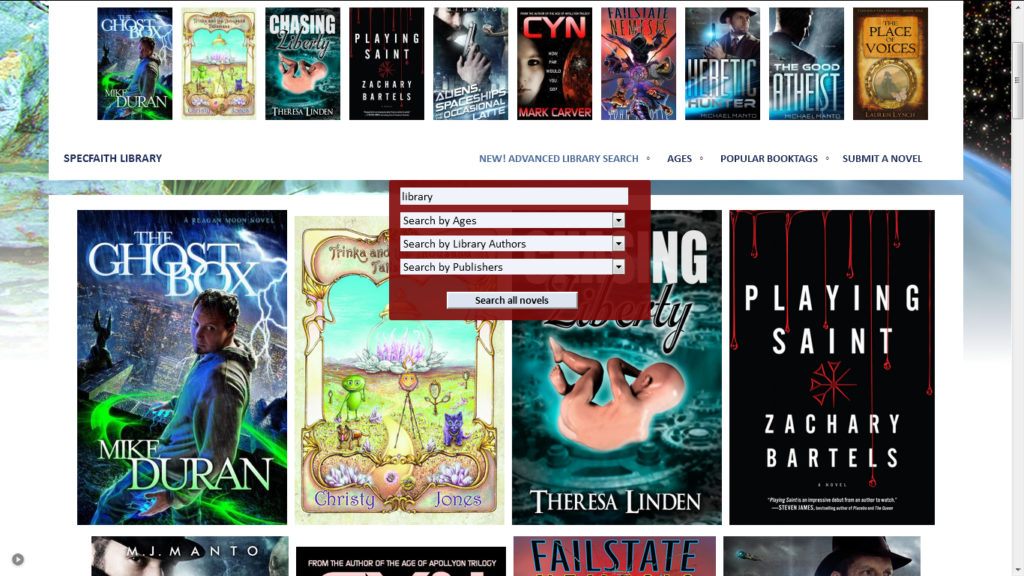

 Here’s the good news: Your webslinger (me) has already been working on such changes. And on March 1, SpecFaith 2015 will look better and will be easier to navigate than ever.
Here’s the good news: Your webslinger (me) has already been working on such changes. And on March 1, SpecFaith 2015 will look better and will be easier to navigate than ever.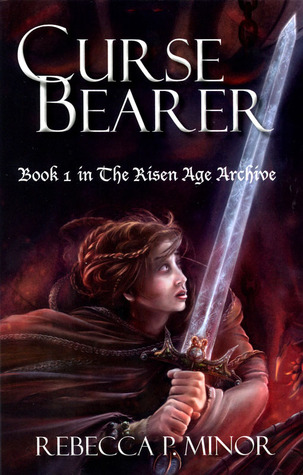
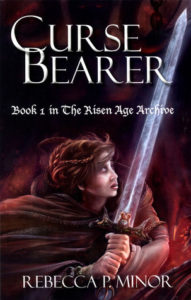

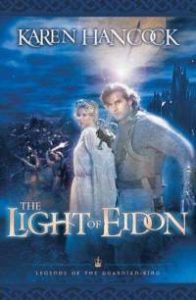

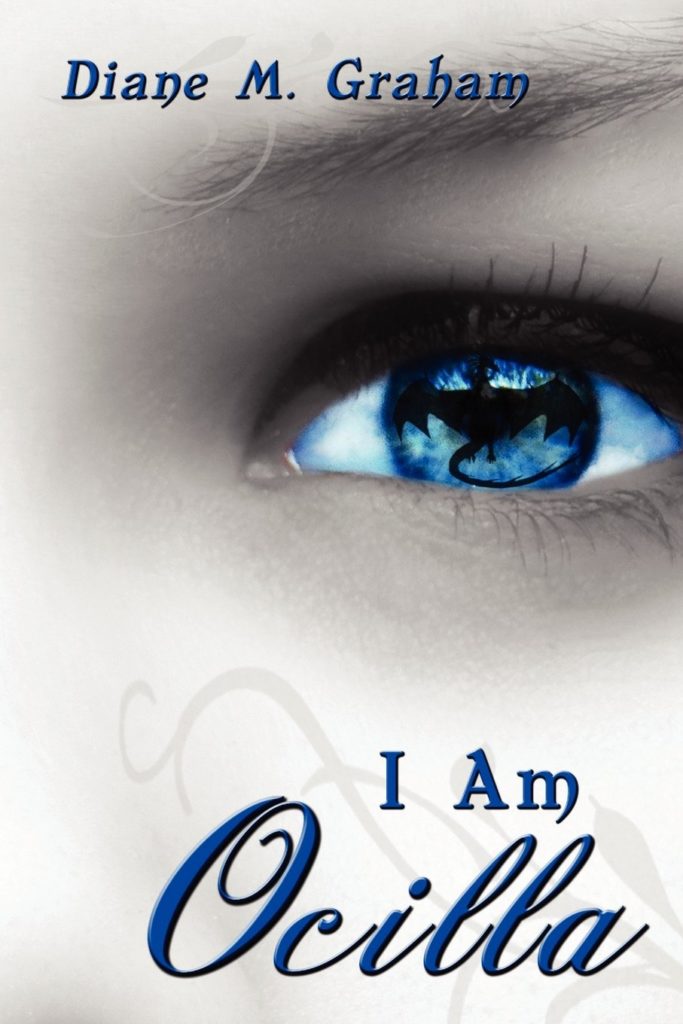




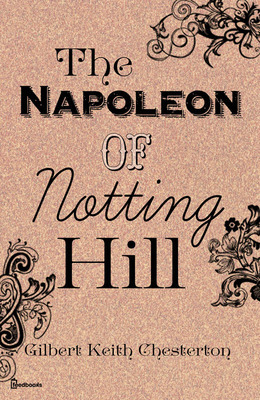
 G.K. Chesterton’s The Napoleon of Notting Hill came to me like that. I loved the humor, the dialogue, the surprises, the two starring lunatics; I loved the ending, which was a revelation of the entire book. I was fascinated by what questions the novel raised, and how. I wrote
G.K. Chesterton’s The Napoleon of Notting Hill came to me like that. I loved the humor, the dialogue, the surprises, the two starring lunatics; I loved the ending, which was a revelation of the entire book. I was fascinated by what questions the novel raised, and how. I wrote 
